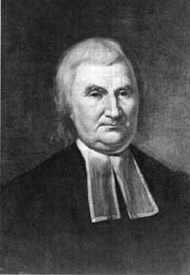John Witherspoon
 From Conservapedia
From Conservapedia | Founding Fathers | |
|---|---|

| |
| John Witherspoon | |
| State | New Jersey |
| Religion | Christian- Presbyterian [1] |
| Founding Documents | Declaration of Independence, Articles of Confederation |
John Witherspoon (February 5, 1723 – November 15, 1794) was a minister, college president, and member of the Continental Congress.
Contents
Early life[edit]
Witherspoon was born in Gifford, East Lothian, Scotland in February 1722. At the age of fourteen he attended the University of Edinburgh, and when he was twenty-one he followed in his father's footsteps and became a Church of Scotland minister.
Career[edit]
Witherspoon wrote an acclaimed theological series while installed as pastor, first at Beith, Ayrshire, and then as minister of the Laigh Kirk ("Low Church") in Paisley. In 1766, he declined his election to the presidency of the College of New Jersey (now University) in the American Colonies because his wife, Elizabeth Montgomery, was reluctant to leave Scotland. However, due to the influence of friends, the family decided to move to the Colonies to accept the job offer in August 1768.[2]
He was inaugurated to the position of president of Princeton College in 1774, and contributed a significant amount of books to the university's library. One of Witherspoon's greatest contributions during his tenure as president was his endeavor to unite the Presbyterian Church in America.
Continental Congress[edit]
His involvement in politics began during his time serving as president of Princeton, where he wrote numerous articles criticizing British rule in America. On June 22, 1776, after taking part as a member of the Provincial congress in the overthrow of the authority of the royal governor, William Franklin, Witherspoon was elected to represent New Jersey in the Second Continental Congress.[3]
He was a strong advocate of the Declaration of Independence and grew impatient as congress members debated the merits of the document. Witherspoon voted affirmative for independence on July 2, 1776. During the British occupation, they took over large parts of New Jersey, including Princeton and surrounding areas. During this time, they deliberately vandalized buildings at the college and burned its library to the ground.[4] In the waning hours of the Battle of Princeton, British forces barricaded themselves in Nassau Hall. It took Witherspoon years to rebuild the college after the battles ended.[5]
After the Battle of Germantown in 1777, Witherspoon received the sad news that his son James, a major in the Continental Army, had been killed.[6][7][8]
Later life[edit]
In 1779, after more than six years and service in more than one hundred committees, Witherspoon voluntarily retired from his seat in the Continental Congress. He was persuaded to return to Congress in 1780, but at the close of 1782, he again retired from political life.
Quotes[edit]
- "Some nations have given parents the power of life and death over their children....... We have denied the power of life and death to parents." - Lectures on Moral Authority: Relation of Parents and Children[9]
See also[edit]
References[edit]
- ↑ http://www.adherents.com/gov/Founding_Fathers_Religion.html
- ↑ http://etcweb.princeton.edu/CampusWWW/Companion/witherspoon_john.html
- ↑ http://www.ushistory.org/declaration/signers/witherspoon.htm
- ↑ John Witherspoon's American Revolution
- ↑ The Presbyterians
- ↑ Proceedings and Collections, Wyoming Historical Society
- ↑ The Battle of Germantown
- ↑ The Piety of John Witherspoon
- ↑ The Works of John Witherspoon, D.D., pp. 91-92
External links[edit]
| ||||||||||||||||||||||||||||||||||||||||||||||||||
Categories: [Founding Fathers] [Religion and Politics] [Presbyterians]
↧ Download as ZWI file | Last modified: 02/22/2023 05:50:36 | 17 views
☰ Source: https://www.conservapedia.com/John_Witherspoon | License: CC BY-SA 3.0
 ZWI signed:
ZWI signed:
 KSF
KSF